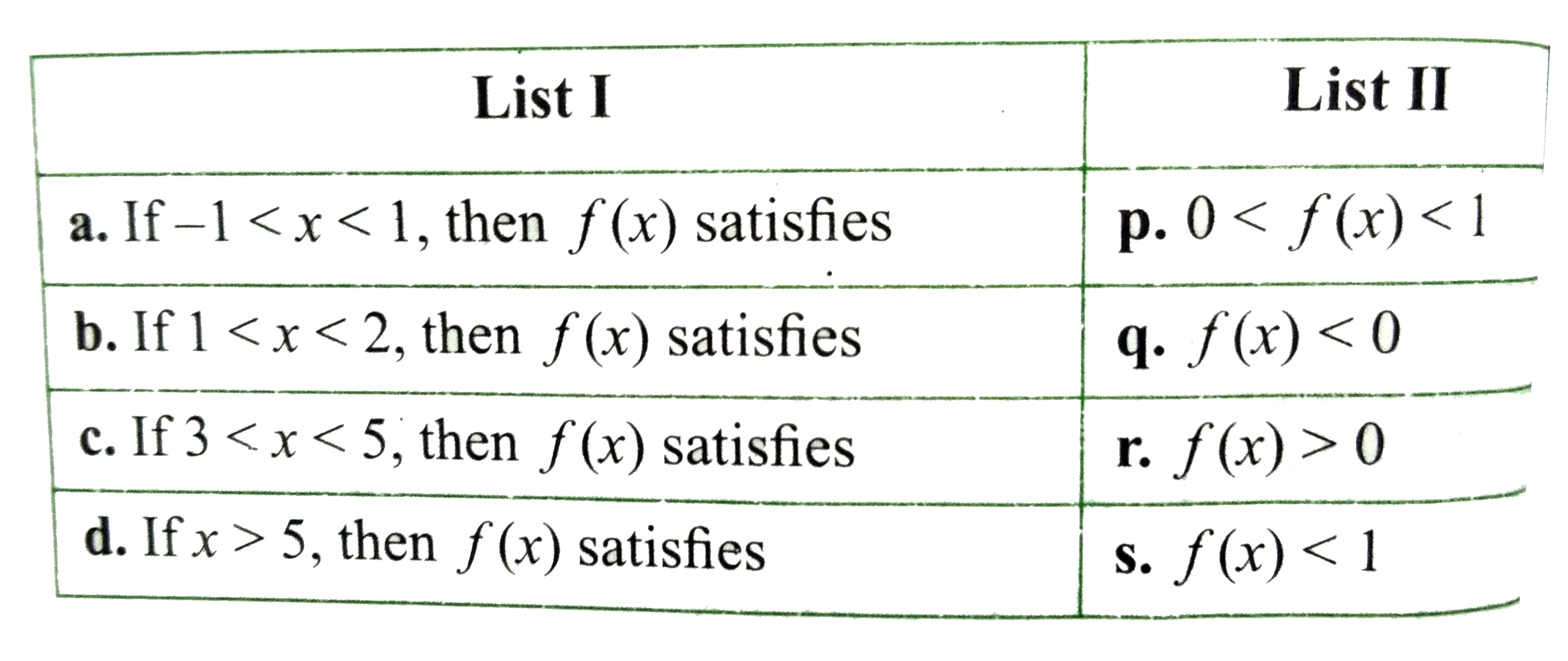For the following questions, choose the correct answer from the codes (a), (b), (c) and (d) defined as follows. Let F(x) be an indefinite integral of sin2x.
Statement I The function of F(x) satisfies
F(x+π)=F(x) for all real x. Because
Statement IIsin2(x+π)=sin2x, for all real x.
Match the conditions/expressions in Column I with statement in Column II.
Statement-1 is True, Statement-2 is True and Statement-2 is a correct explanation for Statement-1
Statement-1 is True, Statement-2 is True and Statement-2 is NOT a correct explanation for Statement-1
Statement-1 is True, Statement-2 is False
Statement-1 is False, Statement-2 is True
Step by step video solution for For the following questions, choose the correct answer from the codes (a), (b), (c) and (d) defined as follows. Let F(x) be an indefinite integral of sin^(2)x. bb"Statement I" The function of F(x) satisfies F(x+pi)=F(x) for all real x. Because bb"Statement II" sin^(2)(x+pi)=sin^(2)x, for all real x. Match the conditions/expressions in Column I with statement in Column II. by Maths experts to help you in doubts & scoring excellent marks in Class 12 exams.
Updated on:21/07/2023Topper's Solved these Questions
- FUNCTIONSBOOK - VMC MODULES ENGLISHCHAPTER - FUNCTIONSEXERCISE - JEE Main & Advanced
8 Videos
- FUNCTIONSBOOK - VMC MODULES ENGLISHCHAPTER - FUNCTIONSEXERCISE - Level -2 (Numerical Value Type for JEE Main)
14 Videos
- DIFFERENTIAL EQUATIONSBOOK - VMC MODULES ENGLISHCHAPTER - DIFFERENTIAL EQUATIONSEXERCISE - JEE ADVANCE (ARCHIVE )
32 Videos
- INTEGRAL CALCULUS - 2 BOOK - VMC MODULES ENGLISHCHAPTER - INTEGRAL CALCULUS - 2 EXERCISE - JEE Advanced (Archive)
103 Videos
Similar Questions
Let F(x) be an indefinite integral of sin2x
Statement I The function F(x) satisfies F(x+π)=F(x) for all real x.
Because
Statement II sin2(x+π)=sin2x, for all real x.
View SolutionLet F(x) be an indefinite integral of sin2x
Statement-1: The function F(x) satisfies F(x+π)=F(x) for all real x. because
Statement-2: sin3(x+π)=sin2x for all real x.
A) Statement-1: True , statement-2 is true, Statement -2 is not a correct explanation for statement -1
c) Statement-1 is True, Statement -2 is False.
D) Statement-1 is False, Statement-2 is True.
View Solution
Knowledge Check
If f(x)=2 for all real numbers x, then f(x+2)=
A0B2C3Dx
If a real valued function f(x) satisfies the equation f(x+y)=f(x)+f(y) for all x,y∈R then f(x) is
View SolutionStatement I The equation f(x)=4x5+20x−9=0 has only one real root.
Statement IIf'(x)=20x4+20=0 has no real root.
View SolutionA function f(x) satisfies the functional equation x2f(x)+f(1−x)=2x−x4 for all real x.f(x) must be
View SolutionLet f(x)=x2−6x+5x2−5x+6. Then match the expressions/statements in List I with expression /statements in List II.

View SolutionLet f(x)=sin(x3)+cos(3x10) for all real x. Find the least natural number n such that f(nπ+x)=f(x) for all real x.
View SolutionStatement I The function f(x) =xsinx and f'(x)=xcosx+sinx are both non-periodic.
Statement II The derivative of differentiable functions (non-periodic) is non-periodic funciton.
View Solutionf is a function defined on the interval [-1,1] such that f(sin2x)=sinx+cosx. Statement I If x∈[−π4,π4], then f(tan2x)=secx Statement IIf(x)=√1+x,∀x∈[−1,1]
View Solution
